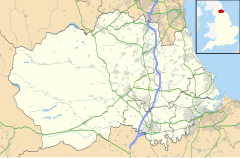Westerton is a village and former civil parish in the County Durham district, in the ceremonial county of Durham, England.[1] In the 2001 census Westerton had a population of 44.[2] It is situated between Bishop Auckland and Spennymoor. It sits on top of a hill which is one of the highest points in County Durham, and is the location of an observatory built for Thomas Wright, who was the first person to suggest that the Milky Way consisted of a flattened disk of stars. The observatory is known today as "Wright's Folly".
| Westerton | |
|---|---|
 Wright's Observatory/Folly | |
Location within County Durham | |
| Population | 44 (2001 census) |
| OS grid reference | NZ239311 |
| Unitary authority | |
| Ceremonial county | |
| Region | |
| Country | England |
| Sovereign state | United Kingdom |
| Post town | DARLINGTON |
| Postcode district | DL14 |
| Police | Durham |
| Fire | County Durham and Darlington |
| Ambulance | North East |
Civil parish
editWesterton was formerly a township in the parish of Auckland-St. Andrew,[3] from 1866 Westerton was a civil parish in its own right, on 1 April 1937 the parish was abolished and merged with Bishop Auckland, part also went to form Spennymoor.[4] In 1931 the parish had a population of 524.[5]
References
edit- ^ Ordnance Survey: Landranger map sheet 93 Middlesbrough (Darlington & Hartlepool) (Map). Ordnance Survey. 2010. ISBN 9780319228777.
- ^ "Wear Valley Settlement Summary Sheets" (PDF). Durham County Council. Archived from the original (PDF) on 7 October 2007. Retrieved 14 October 2016.
- ^ "History of Westerton, in Wear Valley and County Durham". A Vision of Britain through Time. Retrieved 7 August 2023.
- ^ "Relationships and changes Westerton Tn/CP through time". A Vision of Britain through Time. Retrieved 7 August 2023.
- ^ "Population statistics Westerton Tn/CP through time". A Vision of Britain through Time. Retrieved 7 August 2023.
External links
edit
